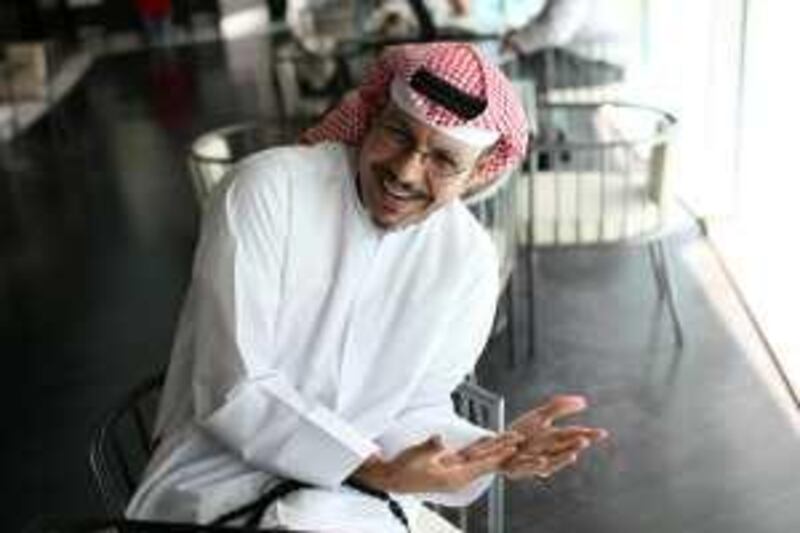Ammar Shams has been on the front line of the fight to encourage more Emiratis to work in the private sector for more than two decades. Mr Shams, 45, started his career in human resources in the mid-1980s at the Dubai Natural Gas company.
Although still something of an exception as an Emirati working in the private sector, he insists the country has come a long way in a short time. Now the head of human resources for HSBC Middle East in the GCC, Mr Shams remembers a time when most companies had two payrolls - one for Asian white- and blue-collar workers, and another for western managers. The western managers would say: "Why would we hire an Emirati when we can hire an Asian, with experience, for cheaper?" he says.
In the mid-1980s he says the private workforce was so stratified by race that a person's position could be discerned instantly by the colour of their skin. A non-western chief executive would have been extremely unusual. "Our contribution to an organisation was irrelevant," Mr Shams says. "It was our origin that mattered." And, he says, such distinctions were not limited to the work environment alone. He recalls one example he came across when he first started working for Dubai Natural Gas: back then, he says, western workers were allocated accommodation where two people shared, while Asians were housed in dormitories of up to 60 people.
His employers, he says, were unsure of where to house Emiratis in managerial positions. "A Texan man came up to me and said, 'All right, Shams?' I knew he was serious because he used my last name. 'Are you going to put the brown guy in with the white guys?' That's the environment we were trying to Emiratise," he says. Although jobs in the emirate are still ethnically stratified, the situation has improved dramatically in the past couple of decades.
Today, after overturning stereotypes such as laziness among nationals, those same workplaces are now 80 per cent Emiratised, he says. "This is the most privileged generation in the history of mankind," Mr Shams adds. Emiratis are safe and well educated. The Government will provide scholarships to the best schools to the most competent. They are mobile and tend to speak several languages. On the other hand, he says, "We have to prove ourselves in our own country.
"Emiratis have massive advantages and massive disadvantages working in the private-sector workforce. "It becomes a self-fulfilling prophecy. If you give me nothing to do and I do nothing, you fail. But that's not a valid test." During his career, Mr Shams avoided the usual stints in the public sector. Instead, he decided to go into the oil business because, he says, it gave him a better opportunity to learn.
Before that, he attended St Mary's school in Dubai. "My dad wanted me to go to an English curriculum school and that was one of two," he says. "I never made altar boy." Those were the days before federation, when the teachers were nuns and days started with recitations of the Lord's Prayer. "I still remember that. Then when I was eight or nine, somebody cottoned on to the fact that they really shouldn't do that in a Muslim country," he says, laughing. Classes were subsequently held in Arabic and included Quranic studies.
At 16, he was sent to Britain to complete an undergraduate degree in economics at the University of Kent in Canterbury. He returned to Dubai in his early 20s and steadily progressed at Dubai Natural Gas. "Then I just plateaued, basically," he says. "I was turning brain-dead because the years were blending, one into another." It was not until the age of 39 that he radically changed course. "I decided to jump off a cliff," he says. He and his wife and daughter returned to Britain to pursue additional degrees. He gained a master's degree in Shariah law and hopes to go back to complete a PhD.
After returning home, he took the role as head of HR at HSBC because, he says, he wanted to work for a multinational firm. He now oversees 5,000 people but will soon move into another role altogether as head of internal and international business development. Mr Shams remains a passionate advocate for Emiratisation in the private sector and says too few companies are taking the task seriously. While conceding that the public sector offers an attractive option to most Emiratis, he says it is the private sector that has the responsibility to match the career development, training and salary.
"Because we are at a certain point in our socioeconomic development, it's not a level playing field. We need to have affirmative action. You always try to correct historical imbalances by affirmative action." And the companies themselves need to look at discriminatory practices and stereotyping. "I have seen more discrimination from people who come from companies whose countries espouse equality and fairness for all," he says. "In workplaces here, the free market approach in the private sector allows the worst of human nature to come to the fore."
The laws preventing such practices are there, he says, but multinational companies have a moral obligation to contribute to the growth and development of the indigenous population. @Email:jgerson@thenational.ae






